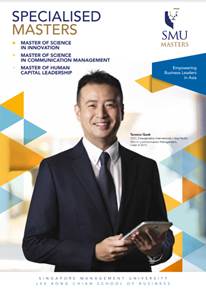
The rise of nimble start-ups, aided by the democratisation of technology and globalisation, has disrupted the business landscape over the past decade. In today’s volatile world, change is the only constant. Companies need to stay competitive by honing their design and creative thinking capabilities and gain insights into market trends and strategies in order to sustain agile company growth.
That thinking spurred food services professional Sonam Sardar to pursue a Master of Science in Innovation (MI) at the Singapore Management University (SMU) Lee Kong Chian School of Business (LKCSB) in 2013.
Sonam says: “We are in a disruptive era that demands innovative thinking to break down high-hanging fruit challenges. Getting a Master’s degree in Innovation Management was extremely attractive to me as I wanted to gain a competitive advantage in a saturated labour market.”
The MI is a cross-disciplinary programme that focuses on innovative pedagogy and entrepreneurship that is tailored for the Asian business landscape. Spanning 12 to 15 months, the practice-based programme trains students to develop strategic concepts and ideas, and build innovative products, services and processes.
They also learn how to launch a product, what entails successful commercialisation, how to manage risk and sustain business growth. To round up their experience, and add to their international exposure, the students also attend a one-week residency in Babson College, a school renowned for its entrepreneurship education, in the United States.
For Sonam, the MI programme equipped her with “a better sense of entrepreneurial bootstrapping through cracking corporate innovation, identifying opportunities and finding creative ways to solve challenges”. These knowledge and skills proved to be useful when she snagged a job as a Global Data Analyst and Insights Lead at dairy nutrition giant Fonterra after she graduated from SMU in 2014.
Sonam found that her experience in the MI programme was applicable to Fonterra, which is a New Zealand dairy co-operative of 10,000 farming family shareholders — one of the largest networks of entrepreneurs globally.
“I wouldn’t have had the opportunity to find such a great fit if I didn’t attend the MI programme, which set me up to have a mindset of a business owner,” she adds.
Hailing from a cosmopolitan background, Sonam grew up across 10 different countries and 14 cities around the globe before completing her undergraduate studies in Hong Kong and finally relocating to Singapore. She recalls: “I found myself in a completely new environment and believed the best way to stand out from other job applicants was to develop stronger technical skills and build diverse networks through the pursuit of a higher education.”
She chose SMU as she was attracted by its pragmatic learning approach that includes lively classroom debates, presentations and group activities that closely resemble business realities.
One of her highlights in the MI programme was presenting her team’s capstone project to three seasoned entrepreneurs and venture capitalists during the one-week residency at Babson College. Through the invaluable experience, she learned a critical lesson in thinking as big as possible. She says: “I will never forget how we were asked to rationalise our growth projections and as we tried to explain it, we were made aware of an even larger opportunity that we were leaving on the table.”
Another stand-out experience was taking part in the MI programme’s design-thinking module which grapples with the challenge of building solutions for problems that have not been clearly defined.
She adds: “After graduating, my company initiated an undergraduate competition with 40 SMU students to leverage design thinking to find out what makes a good bakery. Five years on, the insights developed still play an important role in the foundation of Fonterra’s global foodservice strategy.”
Sonam has also applied design thinking in her line of work. During her time as National Marketing Manager in Fonterra in Indonesia, she used design thinking to drive business strategies. She says: “We identified new key business channels and supporting marketing solutions to accelerate growth. The results have generated significant sustainable profitability for the Indonesian business and the model is now being replicated in other markets in the region.”
When asked about the three biggest takeaways from the MI programme, she quips: “You are never too big to die, what got you here will not get you there, and be externally focused.”
"You will learn a lot, and more importantly, you will have loads of fun doing it.”
Speak to our Admissions Advisors
Lee Kong Chian School of Business
Postgraduate Admissions
Singapore Management University
Level 4, Postgraduate Programmes Office
50 Stamford Road, Singapore 178899
Tel: +65 6828 0882
Join us at the upcoming events
Kyobashi, 1 Chome−3−5 三井ガーデンホテル 1F
Chuo City, Tokyo, 〒104-0031, Japan
1 Raffles Drive, Makati Avenue, 1224, Makati City
